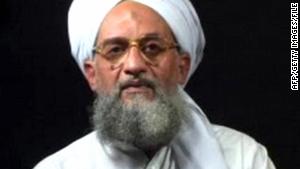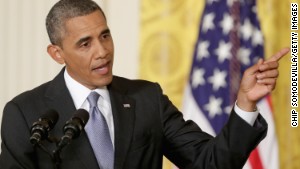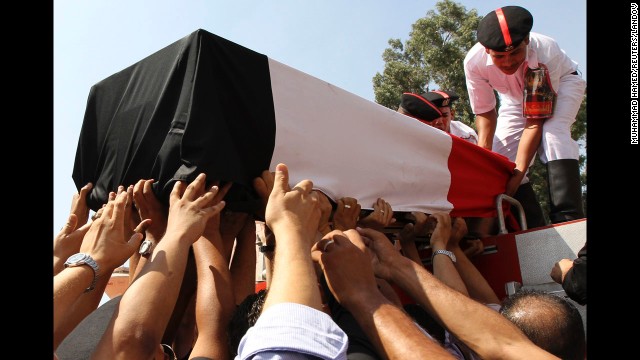STORY HIGHLIGHTS
- Al Qaeda's boss, Ayman al-Zawahiri, warned against Islamist parties participating in elections
- Peter Bergen says Zawahiri cites Egypt's ouster of Muslim Brotherhood government
- He says Zawahiri is proving to be more effective in leading al Qaeda than predicted
- Bergen: Al Qaeda marking its 25th anniversary; Zawahiri may help determine if it survives
Editor's note: Peter Bergen is CNN's national security analyst, a director at the New America Foundation and the author of "Manhunt: The Ten-Year Search for bin Laden -- From 9/11 to Abbottabad."
(CNN) -- Ayman al-Zawahiri, the Egyptian-born leader
of al Qaeda, has seen this movie before: An Islamist party does well at
the polling booth only to be overthrown by a military coup that then
plunges the country into chaos.
This is what happened in
Algeria in 1991. Tens of thousands died in the subsequent Algerian civil
war that ripped the nation apart during the 1990s.

Peter Bergen
The lesson that Zawahiri
drew from the Algerian war was that participating in democratic
elections was strictly for suckers; far better to seize power through
violence and then impose Taliban-style sharia law because "the
crusaders" and their allies in the Arab world would never allow the
emergence of a true Islamist state.
In 1991, the same year
that the Algerian civil war began, Zawahiri released his first book,
"The Bitter Harvest." The book was a vicious diatribe against the Muslim Brotherhood and other similar Islamist parties for participating in "democracies, elections and parliaments."
Now Zawahiri gets to say
"I told you so." Earlier this month Zawahiri posted a 15-minute
recording on militant websites. In the recording Zawahiri explained that
the military coup that deposed Egypt's elected president, Muslim
Brotherhood leader Mohamed Morsy, proved that democracy had failed.
Until recently Zawahiri
has been largely overshadowed by his charismatic former boss Osama bin
Laden who was killed in a U.S. Navy SEAL raid in Abbottabad, Pakistan,
two years ago.
Now the 62-year-old
Zawahiri has dramatically stepped into the spotlight as the leader of al
Qaeda and its several affiliated groups around the world.
The message traffic during the past weeks between Zawahiri and the commander of al Qaeda's virulent Yemeni affiliate contained code words suggesting some kind of attack was potentially imminent.
Those messages were
intercepted by American intelligence and led to the unprecedented
closure last week of some two-dozen U.S. embassies and consulates across
the Middle East, South Asia and Africa. Germany, France and Britain
also closed their embassies in Yemen because of the threat.
Zawahiri's success or
failure as the head of al Qaeda will be crucial to how the terror
network moves forward as it marks its first 25 years of existence this
weekend.
A recent Harvard Kennedy School study of 131 terrorist groups that have gone out of business found that they averaged 14 years of existence.

Ayman Al-Zawahiri.
Al Qaeda has already
shown an ability to survive well beyond the life of an average terrorist
group. The big question is whether Zawahiri can successfully lead the
al Qaeda network so it can thrive in today's chaotic conditions in the
Middle East and can last another 25 years.
Zawahiri is a humorless
religious fanatic whose forehead is marked with a prominent black scar
known in Arabic as a zabiba or "raisin," the result of the many decades
he has spent touching his head repeatedly to the floor as he prostrated
himself in prayer.
Despite his dour
personality, Zawahiri has proven to be more capable as the leader of al
Qaeda than many analysts -- including myself — had initially thought.
In the past year
Zawahiri has brought two new official affiliates into the al Qaeda
network: Somalia's militant al-Shabaab group and Syria's Jabhat
al-Nusra, which is widely regarded as the most effective force fighting
the Assad regime.
 Obama on Egypt: Violence needs to stop
Obama on Egypt: Violence needs to stop
 Al Qaeda leader orders immediate action
Al Qaeda leader orders immediate action
 Crisis in Egypt
Crisis in Egypt
Zawahiri also had no
problem transferring already existing al Qaeda affiliates' allegiances
from bin Laden to himself. In the three months following bin Laden's
death, the leaders of al Qaeda in Iraq, the Yemeni-based al Qaeda in the
Arabian Peninsula and the North African al Qaeda in the Islamic Maghreb
all pledged their allegiance to Zawahiri as their new overall commander.
Zawahiri has been
preparing for this moment all his life, first setting up a jihadist cell
in his native Cairo when he was only 15. Like many revolutionaries
before him Zawahiri is the son of privilege -- he's from a prominent Egyptian family of ambassadors, lawyers and clerics.
As a teenager Zawahiri
believed that the Egyptian government led by Anwar Sadat had abandoned
Islam and therefore had to be overthrown. Sadat signed Egypt's ceasefire
agreement with Israel in 1979, effectively signing his own death
warrant.
In 1981, now trained as a
surgeon, Zawahiri was arrested along with hundreds of others for his
alleged role in Sadat's assassination and was imprisoned and tortured by
Egyptian authorities, an experience that further radicalized him.
Once he was out of jail
in the mid-1980s, Zawahiri made his way to Peshawar, Pakistan, where
thousands of militant Arabs were then gathering to support the Afghan
jihad against the Soviet Union.
It was there in 1986
that Zawahiri first met bin Laden, at that time the shy, monosyllabic
son of a Saudi billionaire. For bin Laden the slightly older, cerebral
Zawahiri presented an intriguing figure, someone far more experienced
politically than himself. For Zawahiri, bin Laden also presented an
interesting opportunity: someone who was on his way to becoming a
genuine war hero in the jihad against the Soviets and whose deep pockets
were well known. They would go on to embark on a marriage of
convenience that would have hellish consequences.
During the late 1980s
Zawahiri gradually won over bin Laden to his more expansionist view of
jihad. Faraj Ismail, an Egyptian journalist who covered the Afghan war
against the Soviets, recalls that it was Zawahiri "who got Osama to
focus not only on the Afghan jihad, but regime change in the Arab
world."
Bin Laden then took the
next step, urging Zawahiri to see that the root of the problem was not
simply the Arab "near enemy" regimes, but the "far enemy," the United
States, which propped up the status quo in the Middle East, a shift in
strategy that took place when al Qaeda was based in Sudan in the early
1990s. Bin Laden lectured to his followers there about the necessity of
attacking the United States without which the "near enemy" regimes could
not survive. Noman Benotman, a Libyan militant who was then close to
bin Laden and Zawahiri, recalled that, "Osama influenced Zawahiri with
his idea: Forget about the 'near enemy;' the main enemy is the
Americans."
When Zawahiri first
arrived in Taliban-controlled Afghanistan in 1997, following a six-month
spell in a Russian jail, his relations with bin Laden were on a quite
different footing than they had been a decade earlier. Bin Laden was now
the head of a fast-expanding terrorist organization while Zawahiri was
the penniless leader of an obscure Egyptian terrorist group.
It was now bin Laden who
took Zawahiri under his wing. And even then bin Laden kept Zawahiri at
some distance. It was only in the summer of 2001 that al Qaeda's leader
told Zawahiri the details of the coming attacks on New York and
Washington, and that was only after Zawahiri's Egyptian Jihad Group had
formally merged with al Qaeda in June.
Bin Laden exercised
near-total control over al Qaeda, whose members had to swear a religious
oath personally to bin Laden, so ensuring blind loyalty to him. Bin
Laden's son Omar recalls that the men who worked for al Qaeda had a
habit of requesting permission before they spoke with their leader,
saying, "Dear prince: May I speak?" Even Zawahiri would ask bin Laden to
be permitted to speak.
But now that he is the
new boss of al Qaeda, Zawahiri has shown that he no longer feels bound
by bin Laden's previous decisions. In 2010 bin Laden instructed the
Somali militant group al-Shabaab to keep its association with al Qaeda a
secret, fearing that openly linking the two organizations would hinder
Shabaab's fundraising efforts. Zawahiri, who had petitioned bin Laden to
reconsider his views about the proposed merger between al-Shabaab and
al Qaeda, announced formal ties between the two groups in early 2012.
Zawahiri, however, has
also had some problems keeping control over the far-flung al Qaeda
network. During the spring of 2013 Zawahiri personally intervened to
settle a dispute between the Syrian militant group Jabhat al-Nusra and
al Qaeda in Iraq. Zawahiri rejected al Qaeda in Iraq's assertion of
control over al-Nusra and declared the Syrian group to be under his
direction.
However, in June 2013,
Abu Bakr al-Baghdadi, the leader of al Qaeda in Iraq (AQI), posted an
audio recording online rejecting the order from Zawahiri. This shows
that AQI is willing to go public to dismiss the directives of al Qaeda's leader, something that would have been unimaginable when bin Laden was in charge.
After 9/11, Zawahiri acknowledged in his autobiography "Knights Under the Banner of the Prophet" that the most important strategic goal
of al Qaeda was to seize control of a state, or part of a state,
somewhere in the Muslim world, explaining that, "without achieving this
goal our actions will mean nothing."
Indeed, the yardstick by
which Zawahiri will be judged as an effective leader of al Qaeda by his
fellow militants is the extent to which he can take advantage of the
chaotic post-Arab spring conditions in countries such as Egypt, Yemen,
Syria, Iraq and Libya to establish safe havens for al Qaeda and its
affiliated groups and use those havens to then launch effective attacks
against Western targets.
In Pakistan where
Zawahiri is generally believed to be hiding and also in Yemen, CIA drone
shrikes have eliminated dozens of al Qaeda's leaders over the past
three years and establishing a viable safe haven in either country seems
quite unlikely. However, a long-term safe haven for Jabhat al-Nusra, al
Qaeda's affiliate in Syria, in the heart of the Arab world could create
an organization with the intent and capacity to attack the West.
Jabhat al-Nusra ("the
Victory Front") has been able to garner considerable support from
Syria's Sunni population, because it is the premier fighting force in
the campaign to topple Assad, and because it is providing critical services,
such as food, hospitals and sharia courts to the embattled population.
For the moment, however, Jabhat al-Nusra is entirely focused on
overthrowing the Assad regime, a project that may take years to achieve.
Al Qaeda was founded 25
years ago between August 18 and August 20, 1988 during the course of a
series of meetings that took place over the course of three days in the
sweltering heat of Pakistan's summer in bin Laden's house in the city of
Peshawar.
According to the minutes
of those meetings, bin Laden presided over discussions involving eight
other men who deliberated about how best to establish a new organization
that would take holy war to other countries. The minutes noted
that "al Qaeda is basically an organized Islamic faction; its goal will
be to lift the word of God, to make His religion victorious."
Zawahiri was not at that
founding meeting of al Qaeda and for much of the early history of the
group he was not a central player in the organization. Today Zawahiri is
al Qaeda's overall boss, and he now has the difficult task of turning
around an organization whose last successful attacks in the West were
the multiple suicide bombings on London's transportation system on July
7, 2005.
If he is to succeed,
Zawahiri will have to come up with something more significant than just
getting U.S. embassies and consulates to close for a week.
Wherever Zawahiri is
right now he is surely watching the unrest unfolding in Egypt with
considerable relish and as a real opportunity to exploit. Al Qaeda
aligned groups already have footholds in the remote desert regions of
Sinai in eastern Egypt and organizations such as Zawahiri's own Jihad
Group, which formally merged with al Qaeda in the summer of 2001, have a
long history in Egypt.
 People reach for a coffin on
Thursday, August 15, during a funeral for policemen killed during a
crackdown at two protest camps in support of ousted President Mohamed
Morsy yesterday in Cairo, Egypt. Ferocious clashes on Wednesday, August
14, reportedly left more 500 people dead across Egypt, and authorities
have declared a monthlong state of emergency. The recent string of
violence began when Egyptian security forces stormed two makeshift camps
to clear out Morsy supporters.
People reach for a coffin on
Thursday, August 15, during a funeral for policemen killed during a
crackdown at two protest camps in support of ousted President Mohamed
Morsy yesterday in Cairo, Egypt. Ferocious clashes on Wednesday, August
14, reportedly left more 500 people dead across Egypt, and authorities
have declared a monthlong state of emergency. The recent string of
violence began when Egyptian security forces stormed two makeshift camps
to clear out Morsy supporters.
No comments:
Post a Comment